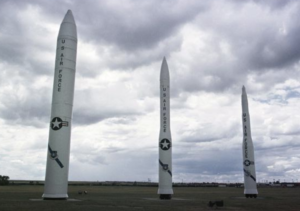
Goldberg, left, in conversation with Michael Oren, Bibi’s man in Washington
The first question to ask when considering how seriously to take Jeffrey Goldberg’s latest alarmist screed about Israel gearing up to attack Iran, is “Why do people talk to Jeffrey Goldberg?”
In the course of an Atlantic Monthly cover story that veers all over the place but whose intended message is that if President Obama won’t bomb Iran, then Israel will — and that everyone will be better off if the U.S. does the job because it can do it so much better — Goldberg describes conversations with 40 leading decision makers in Israel, including Prime Minister Benjamin Netanyahu. And all of them pretty much tell him the same thing; that Israel will give the Obama Administration’s sanctions until the end of this year to demonstrate results in forcing Iran’s surrender on the nuclear question, after which the Israelis will take matters into their own hands, launching an air strike on Iranian nuclear facilities without getting Washington’s go-ahead — because most of Israel’s key decision makers doubt whether Obama is willing to launch another war in the Middle East.
Goldberg, an early enthusiast for invading Iraq, also describes a White House meeting at which Chief of Staff Rahm Emmanuel appears to have convened the likes of Dennis Ross, Dennis McDonough and pretty much all of the President’s top national security advisers, all for the purpose of persuading a columnist from the Atlantic Monthly that Obama is, in fact, acting tough on Iran.
And the answer in both cases, is that people use Jeffrey Goldberg to send messages.
Goldberg, of course, operates with the conceit common to many access journalists, who assume that what they’re hearing from their sources is the unvarnished truth, told to the journalist because they presumably trust him as a confidante and recognize the value of his opinions and insights. Let’s just say that such is the conceit that makes it so easy for those in power in Washington to seduce marquee name journalists to carry water for them by anointing them as “special”, cultivating in the illusion that they’re insiders privy to the inner thoughts of the key power players.
In your dreams, Jeff: The Israelis talk to you because they want to convey a particular message in Washington; and the White House talks to you because they want you to convey a particular message to the Israelis and, more importantly, to some of their most powerful backers in America.
Goldberg says that based on his conversations with roughly 40 current and past Israeli decision makers — including Prime Minister Netanyahu — in which he simply asked what percentage chance of Israel attacking Iran, he can conclude that there is now a greater than 50% chance of Israel doing so by early next year if Iran hasn’t backed down. And then he spins a yarn of dramatic phone calls to the White House one day next spring by top Israeli officials to inform the Americans that the F-15s and F-16s are already airborn and bearing down on Iran, a dramatic decision taken to save the Jews from a new Auschwitz in the fevered fantasy world of Netanyahu (and Goldberg himself). Goldberg offers operational details of such an attack at the same time as noting that the Israeli leadership believes it’s imperative that the U.S. never learns of its attack plans until it’s too late to stop them.
I spoke with several Israeli officials who are grappling with this question, among others: what if American intelligence learns about Israeli intentions hours before the scheduled launch of an attack? “It is a nightmare for us,” one of these officials told me. “What if President Obama calls up Bibi and says, ‘We know what you’re doing. Stop immediately.’ Do we stop? We might have to. A decision has been made that we can’t lie to the Americans about our plans. We don’t want to inform them beforehand. This is for their sake and for ours. So what do we do? These are the hard questions.” (Two officials suggested that Israel may go on pre-attack alert a number of times before actually striking: “After the fifth or sixth time, maybe no one would believe that we’re really going,” one official said.)
So wrapped up is Goldberg in his inflated sense of his own importance that he doesn’t notice how his tale jumps the shark at this point. The Israelis don’t want the Americans to know they’ll attack without a go-ahead. That’s why they’re telling former IDF Corporal Jeffrey Goldberg…
Goldberg does acknowledge, of course, that there may be grounds for skepticism:
(Of course, it is in the Israeli interest to let it be known that the country is considering military action, if for no other reason than to concentrate the attention of the Obama administration. But I tested the consensus by speaking to multiple sources both in and out of government, and of different political parties. Citing the extraordinary sensitivity of the subject, most spoke only reluctantly, and on condition of anonymity. They were not part of some public-relations campaign.) The reasoning offered by Israeli decision makers was uncomplicated: Iran is, at most, one to three years away from having a breakout nuclear capability (often understood to be the capacity to assemble more than one missile-ready nuclear device within about three months of deciding to do so). The Iranian regime, by its own statements and actions, has made itself Israel’s most zealous foe; and the most crucial component of Israeli national-security doctrine, a tenet that dates back to the 1960s, when Israel developed its own nuclear capability as a response to the Jewish experience during the Holocaust, is that no regional adversary should be allowed to achieve nuclear parity with the reborn and still-besieged Jewish state.
Of course Goldberg does not want to believe that those sharing this information with him are not engaged in p.r. No, Jeff, they obviously recognize you as the special one, a deep strategic thinker they can trust with their most sensitive secrets, off the record, of course. Or maybe they just need to talk, and you happened to be there offering a sympathetic ear at the right moment. Get over yourself, Jeff. The idea that Israeli leaders discussing what appear to be strategic options of tectonic import with an American journalist are doing anything other than engaging in p.r. is just plain deluded.
The reasoning offered for the cataclysmic step of bombing Iran — Goldberg acknowledges the potentially catastrophic consequences of launching a war with Iran, and also the fact that bombing Iran may only temporary set back Iran’s nuclear program — is utterly simplistic, and clearly represents Israeli p.r. lines rather than strategic reasoning. For example, Goldberg cites the following from his White House meeting:
Emanuel had one more message to deliver: for the most practical of reasons, Israel should consider carefully whether a military strike would be worth the trouble it would unleash. “I’m not sure that given the time line, whatever the time line is, that whatever they did, they wouldn’t stop” the nuclear program, he said. “They would be postponing.”
It was then that I realized that, on some subjects, the Israelis and Americans are still talking past each other. The Americans consider a temporary postponement of Iran’s nuclear program to be of dubious value. The Israelis don’t. “When Menachem Begin bombed Osirak [in Iraq], he had been told that his actions would set back the Iraqis one year,” one cabinet minister told me. “He did it anyway.”
To suggest that in response to Iran nearing a “breakout” capacity — i.e. not having nuclear weapons, but having the capacity build them — Israel would initiate a strike that would temporarily set back Iran’s pursuit but make it relative certainty that Iran would go ahead and actually build a nuclear arsenal, is to suggest that the Israeli leadership is deranged. (Of course that might be the message they’re trying to send: if you don’t do more on Iran, we’re going to do something crazy…)
But later in the piece, he negates his own point about the Israelis being willing to risk a conflagration in order to temporarily restrain Iran:
There are, of course, Israeli leaders who believe that attacking Iran is too risky. Gabi Ashkenazi, the Israeli army chief of staff, is said by numerous sources to doubt the usefulness of an attack, and other generals I spoke with worry that talk of an “existential threat” is itself a kind of existential threat to the Zionist project, which was meant to preclude such threats against the Jewish people. “We don’t want politicians to put us in a bad position because of the word Shoah,” one general said. “We don’t want our neighbors to think that we are helpless against an Iran with a nuclear bomb, because Iran might have the bomb one day. There is no guarantee that Israel will do this, or that America will do this.”
Indeed, the rhetoric of the politicians about a new Auschwitz and so on ought to be worrying to the generals, not only because it bears little relationship with reality, but also because it creates a public expectation on which they may not be able to deliver.
Goldberg’s Israeli sources make the point that Iran is unlikely to use nuclear weapons against Israel, but that a nuclear-armed Iran is an unacceptable evening out of the balance of forces in the Middle East, and they say the prospect of an Iranian bomb will prompt many talented and smart young Israelis to leave, and fewer Jews to emigrate there. Leaving aside for the moment the fact that this brain drain is already a reality, quite simply because anti-Semitism has been marginalized in the Western world and Israel’s appeal as a “refuge” is not considered relevant in the lives of most Jews, what’s obvious even within the terms of the argument is that Netanyahu’s hysterical rhetoric about Iran’s nuclear program representing a new Holocaust for Israeli Jews could have the effect he fears without Iran having to actually build anything.
And then, of course, there’s the question of why Rahm Emmanuel assembles a cadre of the Administration’s key players on Iran policy to brief Goldberg, exclusively.
The gathering in Emanuel’s office was meant to communicate a number of clear messages to me, including one that was more militant than that delivered by Admiral Mullen: President Obama has by no means ruled out counterproliferation by force. The meeting was also meant to communicate that Obama’s outreach to the Iranians was motivated not by naïveté, but by a desire to test Tehran’s intentions in a deliberate fashion; that the president understands that an Iranian bomb would spur a regional arms race that could destroy his antiproliferation program; and that American and Israeli assessments of Iran’s nuclear program are synchronized in ways they were not before.
Indeed. And why does the White House need to communicate “clear messages” to Jeffrey Goldberg? He inadvertently hints at the reason, without realizing it, elsewhere in the piece, where he recounts this exchange:
Not long ago, the chief of Israeli military intelligence, Major General Amos Yadlin, paid a secret visit to Chicago to meet with Lester Crown, the billionaire whose family owns a significant portion of General Dynamics, the military contractor. Crown is one of Israel’s most prominent backers in the American Jewish community, and was one of Barack Obama’s earliest and most steadfast supporters. According to sources in America and Israel, General Yadlin asked Crown to communicate Israel’s existential worries directly to President Obama. When I reached Crown by phone, he confirmed that he had met with Yadlin, but denied that the general traveled to Chicago to deliver this message. “Maybe he has a cousin in Chicago or something,” Crown said. But he did say that Yadlin discussed with him the “Iranian clock”—the time remaining before Iran reached nuclear capability—and that he agreed with Yadlin that the United States must stop Iran before it goes nuclear. “I share with the Israelis the feeling that we certainly have the military capability and that we have to have the will to use it… I would feel more comfortable if I knew that they had the will to use military force, as a last resort. You cannot threaten someone as a bluff. There has to be a will to do it.”
Okay, so the Israelis are tapping up major Obama donors sympathetic to Israel, obviously to get them to lean on the president in favor of adopting Israel’s solutions to the Iran issue.
TIME’s Massimo Calabresi a few weeks ago noted that the White House was coming under pressure from Congressional Democrats struggling to raise money from traditional Democratic donors worried about Obama’s attitude towards Israel.
The President has been pelted with complaints from Democratic lawmakers channeling fury among some of their Jewish constituents who accuse the Administration of being hostile toward Israel — a fury that lawmakers say has translated into fundraising problems ahead of the election. “The White House claims 80% support among Jews,” says one Jewish House Democrat. “But I tell them it’s the other 20% we’re calling every week for money.”
So why call in Goldberg? Well, quite simply, because Goldberg is one of the most influential opinion-makers among hawkish Israel backers in the Democratic Party camp. Such are his pro-Israel hawk credentials that if Goldberg can be convinced, there’s a chance you can convince the likes of Lester Crown. Not that Rahm succeeded, of course; that’s why Goldberg is pushing the line that Israel is going to do something crazy early next year. But it’s hard to take seriously, nonetheless. On the two previous occasions Israel bombed nuclear facilities in the Middle East (Iraq’s Osirak in 1981 and a suspected Syrian facility two years ago) not a word was breathed about the plan before hand. Tempting as it no doubt must have been, they didn’t even tell Jeffrey Goldberg.
(That’s enough for one night, although there’s more to say; Goldberg spent seven years on his piece, I may need another day or two to formulate a few more responses. In the mean time, read some smart responses from Paul Woodward, Amjad Atallah, Steve Clemons, the Leveretts, and Gary Sick )








